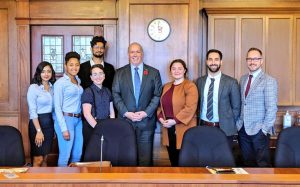
Students meet with government to ask for change
By Katie Czenczek, News Editor
While many others celebrated Halloween, post-secondary students from all over the province came together to lobby for policy revisions.
From October 29 to 31, student unions tied to the British Columbian Federation of Students (BCFS), UBC Alma Matter Society, and the Simon Fraser Student Society sent representatives to Victoria. During their trip, these representatives met with elected officials from the provincial government—and their opposition—to discuss some of the asks the student unions had for the government.
The students were given 25 minutes per meeting to discuss three main topics they wanted the government to focus on, along with providing research about the importance of these topics.
The DSU sent a number of representatives to the legislature including Tanysha Klassen, Director of External Relations, and McKenzie Hutchinson, Director of Finance. The two of them had a phone interview with the Other Press and broke down some of the topics they discussed at the meetings.
Klassen said that the big three topics covered were financial assistance for students, open educational resources (OERs), and a review of sexual assault policies.
“We’d want them to conduct a needs-based assessment to see if institutions need funding for properly implementing those policies,” she said in regard to the sexual assault policy review.
For financial assistance, the main focus was on eliminating interest rates on provincial student loans and implementing a needs-based grant system. As it currently stands in BC, financial assistance for post-secondary education as a grant is generally done post-completion. Hutchinson said that the student representatives wanted to change that.
“We found that only 152 of those completion grants have been given out, and so our ask and question for the government is to reallocate the funds already there for the competition grant to a needs-based grant system,” she said. “That way, students are able to prevent debt before it happens and focus on their success in the classroom as opposed to being stressed about how they will pay for tuition.”
Both Klassen and Hutchinson said that the meetings were overall a success and felt that there was strong dialogue between the politicians and the representatives.
“I think oftentimes it was definitely a dialogue. At all of the meetings, everyone seemed pretty receptive on both sides,” said Hutchinson.
Klassen also added that they made no guarantees.
“There were no promises made, obviously, by anybody,” she said. “There were definitely people who were more supportive of certain things and I think we got the most support for open education resources, which was great. There was a lot of ‘There’s been a lot of unexpected costs since we’ve been elected, so we can’t promise anything,’ blah blah blah, kind of political speak.”
At the meeting, students asked for $5 million to be invested into OERs in order to make free textbooks more likely to be a reality. The money would be given to BCcampus to work on creating more free textbooks. Hutchinson also agreed with Klassen about OERs being the most supported policy ask.
“John Horgan was very excited about the OER ask,” she said. “He was so pleased with the documents and the information surrounding them that he actually went to Minister Melanie Mark and said, ‘This is great, we love this ask, and we could commit to working on this.’”
In order to find out more about these policy asks and the twelve asks for the BC government, you can check out BCFS’s policy document.

